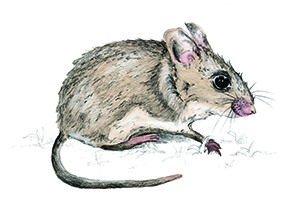Home → Fish & Wildlife → Wildlife → Species Information → Mammals → White Footed Mouse
White Footed Mouse
Peromyscus leucopus
On this page:

Habitat
Lives across many habitats, but mostly in and near forests with deciduous trees; this excellent tree climber is usually the most abundant mouse species in a mixed woodland forest.
Diet
This herbivore eats mostly nuts, berries, seeds, and fungi.
Distinctive Characteristics
Large ears, brown back and white belly fur, a long tail, and large black eyes.
Predators
The white-footed mouse is an important prey for many species of predators, and is also an important host of deer ticks during the larval stage of their life cycle, serving as a reservoir for Lyme disease.
Nocturnal/Diurnal
Mostly nocturnal.
Reproduction & Family Structure
Can have as many as four litters of four to six young per year.